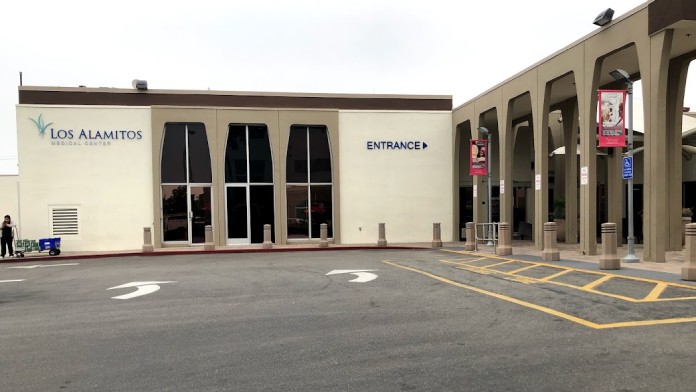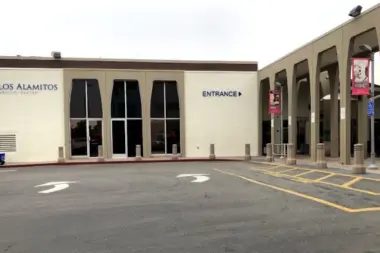About Los Alamitos Medical Center
Los Alamitos Medical Center is now UCI Health, but the hospital is in the same location in Los Alamitos, California. The UCI Health network is nationally recognized for excellence and has six hospitals in Southern California, including the Los Alamitos facility. The hospital has an emergency room where individuals in a mental health or substance misuse crisis can receive care.
Physicians will stabilize you and then refer you to their psychiatry services, where they have 24/7 emergency evaluations. The hospital accepts insurance from a wide variety of providers, including Medicare. It is conveniently located near I-605 and I-405.
Modern Hospital Setting
The hospital offers secure psychiatric and detox units in a modern setting. There are shared therapeutic spaces with individual patient rooms, a cafeteria and in room meals for clients admitted to the unit.
Patients have noted that both the medical and behavioral health staff are attentive and professional. They mention feeling supported during the crisis that brought them to the hospital. Some clients have highlighted the coordination between mental health and medical services for those with complex cases.
The hospital is next to El Dorado Park and Nature Center. Clients’ families can take advantage of the open green spaces to relax while waiting to visit with their loved ones in the program. Downtown Los Alamitos is also nearby, where there are community centers and other helpful resources.
Specialized Treatment Tracks
The addiction and co-occurring mental health treatment services are for adults 18 and older. They have specialized treatment tracks for seniors and older adults receiving behavioral health care.
The clinicians offer tailored treatment services for those having a medical crisis in addition to their addiction problems. Physicians coordinate care with mental health personnel to provide comprehensive treatment.
Facility Overview
Latest Reviews
- UCI Health
- UCI Health
- UCI Health
Rehab Score
Gallery


Accepted Insurance



Other Forms of Payment
Private insurance refers to any kind of healthcare coverage that isn't from the state or federal government. This includes individual and family plans offered by an employer or purchased from the Insurance Marketplace. Every plan will have different requirements and out of pocket costs so be sure to get the full details before you start treatment.
Self-pay involves paying for treatment out of your own pocket. You can use savings or credit, get a personal loan, or receive help from family and friends to fund your treatment. If you don't have insurance or your insurance plan doesn't cover a specific program, self-pay can help ensure you still get the care you need.
Medicare is a federal program that provides health insurance for those 65 and older. It also serves people under 65 with chronic and disabling health challenges. To use Medicare for addiction treatment you need to find a program that accepts Medicare and is in network with your plan. Out of pocket costs and preauthorization requirements vary, so always check with your provider.
Military members, veterans, and eligible dependents have access to specific insurance programs that help them get the care they need. TRICARE and VA insurance can help you access low cost or no cost addiction and mental health treatment. Programs that accept military insurance often have targeted treatment focused on the unique challenges military members, veterans, and their families face.
Addiction Treatments
Levels of Care
Residential treatment programs are those that offer housing and meals in addition to substance abuse treatment. Rehab facilities that offer residential treatment allow patients to focus solely on recovery, in an environment totally separate from their lives. Some rehab centers specialize in short-term residential treatment (a few days to a week or two), while others solely provide treatment on a long-term basis (several weeks to months). Some offer both, and tailor treatment to the patient's individual requirements.
Treatments
Mental health rehabs focus on helping individuals recover from mental illnesses like bipolar disorder, clinical depression, anxiety disorders, schizophrenia, and more. Mental health professionals at these facilities are trained to understand and treat mental health issues, both in individual and group settings.
Clinical Services
Cognitive Behavioral Therapy (CBT) is a therapy modality that focuses on the relationship between one's thoughts, feelings, and behaviors. It is used to establish and allow for healthy responses to thoughts and feelings (instead of unhealthy responses, like using drugs or alcohol). CBT has been proven effective for recovering addicts of all kinds, and is used to strengthen a patient's own self-awareness and ability to self-regulate. CBT allows individuals to monitor their own emotional state, become more adept at communicating with others, and manage stress without needing to engage in substance abuse.
Whether a marriage or other committed relationship, an intimate partnership is one of the most important aspects of a person's life. Drug and alcohol addiction affects both members of a couple in deep and meaningful ways, as does rehab and recovery. Couples therapy and other couples-focused treatment programs are significant parts of exploring triggers of addiction, as well as learning how to build healthy patterns to support ongoing sobriety.
Experiential therapy is a form of therapy in which clients are encouraged to surface and work through subconscious issues by engaging in real-time experiences. Experiential therapy departs from traditional talk therapy by involving the body, and having clients engage in activities, movements, and physical and emotional expression. This can involve role-play or using props (which can include other people). Experiential therapy can help people process trauma, memories, and emotion quickly, deeply, and in a lasting fashion, leading to substantial and impactful healing.
Research clearly demonstrates that recovery is far more successful and sustainable when loved ones like family members participate in rehab and substance abuse treatment. Genetic factors may be at play when it comes to drug and alcohol addiction, as well as mental health issues. Family dynamics often play a critical role in addiction triggers, and if properly educated, family members can be a strong source of support when it comes to rehabilitation.
Group therapy is any therapeutic work that happens in a group (not one-on-one). There are a number of different group therapy modalities, including support groups, experiential therapy, psycho-education, and more. Group therapy involves treatment as well as processing interaction between group members.
In individual therapy, a patient meets one-on-one with a trained psychologist or counselor. Therapy is a pivotal part of effective substance abuse treatment, as it often covers root causes of addiction, including challenges faced by the patient in their social, family, and work/school life.
Contact Information
3751 Katella Avenue
Los Alamitos, CA 90720









